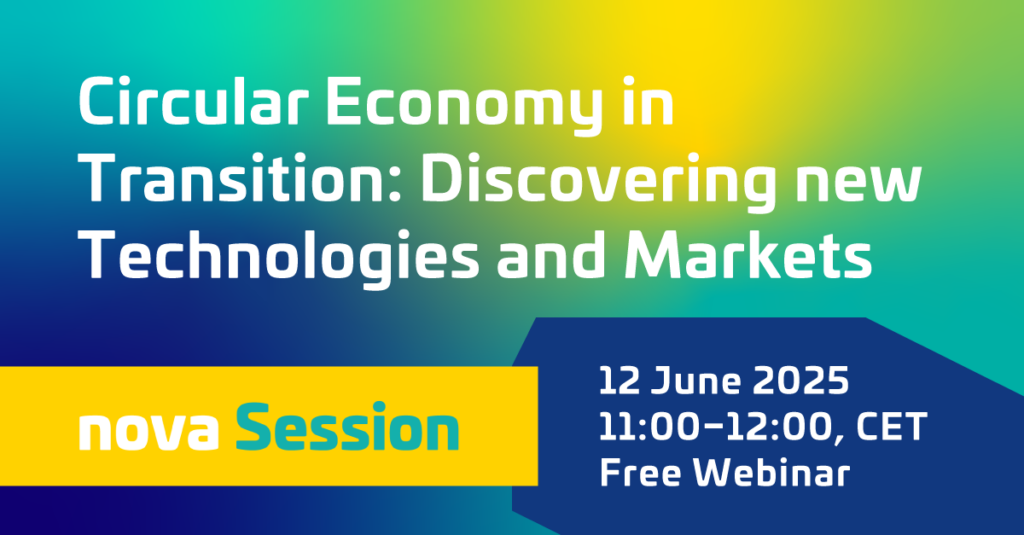Circular Economy in Transition: Discovering new Technologies and Markets
Free nova Session on Emerging Technologies, Markets, and Strategies for a Renewable Carbon Future

At the upcoming free nova Session “Circular Economy in Transition: Discovering new Technologies and Markets”, the nova-Institute will present its comprehensive portfolio of strategic services designed to support innovation and market development in the renewable carbon economy. Participants will gain insight into nova’s expertise in market research, trend and competitive analysis, supply and demand dynamics, feasibility studies, business planning, and tailored expert workshops. The session will demonstrate how these services help companies navigate technological, regulatory, and market challenges to successfully transition towards bio-based, CO₂-based, and recycling-driven solutions. Participants are invited to explore how nova’s data-driven insights and technology scouting can accelerate their path to sustainable growth and innovation.
Market Research: Strategic Orientation in Shifting Markets
Targeted market research is crucial for organisations developing bio-based, CO₂-based or recycling-driven technologies. It identifies relevant sectors, market volumes, capacities, pricing trends and competitive dynamics. These findings enable precise positioning and reduce uncertainties in market entry or expansion strategies. The nova-Institute offers customised market studies that address the needs of innovation-driven clients and help prioritise actions based on robust data.
Trend Reports: Insight into Feedstocks, Technologies and Policy
The portfolio of nova-Institute’s market reports covers all relevant topics on renewable carbon. The reports dive deep into feedstocks for the chemical industry from biomass over CO2 to chemical recycling. They provide a comprehensive overview of bio- and CO₂-based building blocks and polymers, the advanced recycling landscape, as well as specific renewable building blocks as naphtha, comprehensive analyses of the Chinese bio-based and biodegradability landscape, as well as guidelines, standards and labels for bio-based products. The nova-Institute also offers reports on technology, policy, key players and the latest market data available.
Innovation & Technology Scouting: Early Access to Emerging Technologies
Innovation and technology scouting identifies developments in their early stages and evaluates their potential for industrial application. nova-Institute continuously monitors scientific publications, patent activity, and start-up landscapes to pinpoint breakthroughs in renewable carbon technologies. Clients benefit from early insights into scalable solutions, collaboration opportunities and strategic fields for investment and innovation.
Trend & Competitive Analysis: Understanding the Market Environment
Trend and competitor analysis is an integral part of strategic planning, providing organisations with an insight into evolving market dynamics and the competitive landscape. Staying abreast of emerging trends and understanding competitor behaviour is critical to making informed decisions. By using data-driven insights, organisations can identify opportunities, anticipate shifts in consumer preferences and strategically position themselves in the marketplace. Understanding trends and competitors is becoming a strategic imperative for sustainable growth and market leadership. The nova-Institute helps understanding these dynamics.
Supply & Demand Analysis: Forecasting and Resource Planning
Supply and demand analysis is a fundamental framework in economics that reveals the intricate dynamics that shape renewable carbon markets. It examines the interplay between supply and demand as a cornerstone for informed decision-making in various industries. Examining product availability and consumer preferences, the analysis provides a comprehensive overview of markets, production capacity, pricing strategies and potential disruptions. By recognising the critical role of supply and demand insights, organisations can optimise technology development and resource allocation, mitigate risk and capitalise on opportunities in a dynamic and competitive environment. We provide supply and demand analysis as a strategic tool for navigating market complexities and driving sustainable business development.
Feasibility & Potential Studies: Reducing Uncertainty and Identifying Opportunities
Feasibility and potential studies are essential tools for evaluating the viability of new technologies, business models, and value chains in the renewable carbon economy. These analyses provide structured insights into technical feasibility, economic potential, regulatory compliance, and sustainability impact. By examining site-specific factors such as feedstock availability, logistics, and infrastructure, nova-Institute helps companies understand both the risks and opportunities of their planned investments.
Robust due diligence is essential when evaluating new technologies, start-ups or investment opportunities. We provide comprehensive assessments of technical maturity, IP status, market potential and sustainability impact. The analyses provided by the nova-Institute help to de-risk decisions and ensure alignment with strategic, financial and environmental objectives.
Business Planning: From Idea to Market
A strong business plan bridges the gap between technology and market success. We support companies in developing robust, investor-ready business plans that integrate technical feasibility, market dynamics, regulatory frameworks, and financial modelling. The expertise in nova’s Technology & Markets department helps turn innovative bio-based concepts into viable, scalable ventures.
Customised Expert Workshops: Structured Knowledge Transfer
To support informed strategic action and drive innovation, bespoke expert workshops are available to address specific renewable carbon needs. These workshops bring teams together with leading experts to explore technologies, market trends, regulatory landscapes and business strategies. Whether the aim is to deepen internal knowledge, develop strategic roadmaps or identify innovation pathways, the workshops are designed to stimulate dialogue, transfer knowledge and facilitate actionable outcomes. Formats range from compact briefings to multi-day strategy sessions, all based on the latest data, insights and stakeholder dynamics. The interactive environment enables organisations to align priorities, accelerate decision-making and build capacity for sustainable change.
Five reasons to join
- Structured overview of renewable carbon markets and technologies
- Support for strategic decisions and risk mitigation
- Identification of innovation fields and market gaps
- Tailored studies for feasibility, demand, and competition
- Expert formats for targeted knowledge building
Webinar Details & Registration
- Title: Circular Economy in Transition: Discovering New Technologies and Markets
- Date: 22 May 2025
- Time: 10:00–11:30 CEST
- Format: Online nova Session (no fee)
- Speakers: Dr. Pia Skoczinski, Dr. Achim Raschka, Dr. Lars Krause, Narendar Poranki, Gillian Tweddle (nova-Institute)
Interested in more?
The insights and strategic tools shared in this nova Session build upon the expertise presented at two of nova-Institutes conferences: the Renewable Materials Conference from 22 to 24 September and the Advanced Recycling Conference from 19 to 20 November.
Source: nova-Institute, original text, 2025-05-15.
